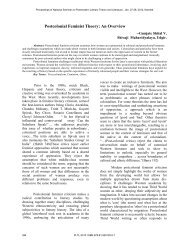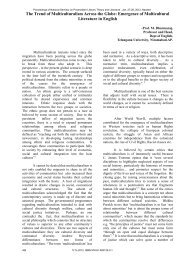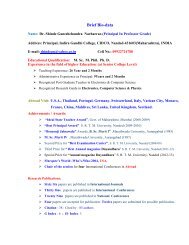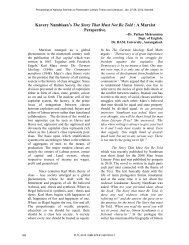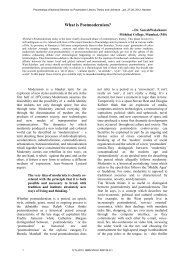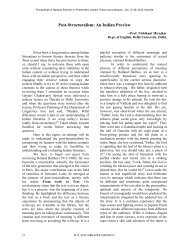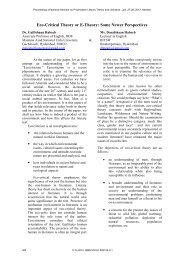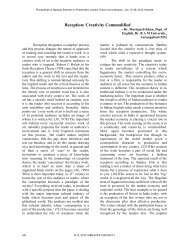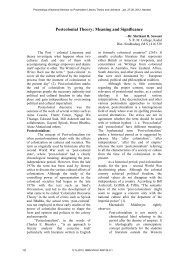Proceedings of National Seminar on Postmodern ... - Igcollege.org
Proceedings of National Seminar on Postmodern ... - Igcollege.org
Proceedings of National Seminar on Postmodern ... - Igcollege.org
You also want an ePaper? Increase the reach of your titles
YUMPU automatically turns print PDFs into web optimized ePapers that Google loves.
<str<strong>on</strong>g>Proceedings</str<strong>on</strong>g> <str<strong>on</strong>g>of</str<strong>on</strong>g> <str<strong>on</strong>g>Nati<strong>on</strong>al</str<strong>on</strong>g> <str<strong>on</strong>g>Seminar</str<strong>on</strong>g> <strong>on</strong> <strong>Postmodern</strong> Literary Theory and Literature , Jan. 27-28, 2012, Nanded<br />
Early film theory arose in the silent era<br />
and was mostly c<strong>on</strong>cerned with defining the<br />
crucial elements <str<strong>on</strong>g>of</str<strong>on</strong>g> the medium. It largely<br />
evolved from the works <str<strong>on</strong>g>of</str<strong>on</strong>g> directors like<br />
Germaine Dulac, Louis Delluc, Jean Epstein,<br />
Sergei Eisenstein, Lev Kuleshov, and Dziga<br />
Vertov and film theorists like Rudolf Arnheim,<br />
Béla Balázs and Siegfried Kracauer. These<br />
individuals emphasized how film differed from<br />
reality and how it might be c<strong>on</strong>sidered a valid art<br />
form. In the years after World War II, the French<br />
film critic and theorist André Bazin reacted<br />
against this approach to the cinema, arguing that<br />
film's essence lay in its ability to mechanically<br />
reproduce reality, not in its difference from<br />
reality.<br />
In the 1960s and 1970s, film theory took<br />
up residence in academia importing c<strong>on</strong>cepts<br />
from established disciplines like psychoanalysis,<br />
gender studies, anthropology, literary theory,<br />
semiotics and linguistics. However, not until the<br />
late 1980s or early 1990s did film theory per se<br />
achieve much prominence in American<br />
universities by displacing the prevailing<br />
humanistic, auteur theory that had dominated<br />
cinema studies and which had been focused <strong>on</strong><br />
the practical elements <str<strong>on</strong>g>of</str<strong>on</strong>g> film writing,<br />
producti<strong>on</strong>, editing and criticism. American<br />
scholar David Bordwell has spoken against<br />
many prominent developments film theory since<br />
the 1970s, i.e., he uses the humorously<br />
derogatory term "SLAB theory" to refer to film<br />
studies based <strong>on</strong> the ideas <str<strong>on</strong>g>of</str<strong>on</strong>g> Saussure, Lacan,<br />
Althusser, and/or Barthes. Instead, Bordwell<br />
promotes what he describes as "ne<str<strong>on</strong>g>of</str<strong>on</strong>g>ormalism."<br />
During the 1990s the digital revoluti<strong>on</strong><br />
in image technologies has had an impact <strong>on</strong> film<br />
theory in various ways. There has been a refocus<br />
<strong>on</strong>to celluloid film's ability to capture an<br />
"indexical" image <str<strong>on</strong>g>of</str<strong>on</strong>g> a moment in time by<br />
theorists like Mary Ann Doane, Philip Rosen<br />
and Laura Mulvey who was informed by<br />
psychoanalysis. From a psychoanalytical<br />
perspective, after the Lacanian noti<strong>on</strong> <str<strong>on</strong>g>of</str<strong>on</strong>g> "the<br />
Real", Slavoj Žižek <str<strong>on</strong>g>of</str<strong>on</strong>g>fered new aspects <str<strong>on</strong>g>of</str<strong>on</strong>g> "the<br />
gaze" extensively used in c<strong>on</strong>temporary film<br />
analysis. There has also been a historical<br />
revisiting <str<strong>on</strong>g>of</str<strong>on</strong>g> early cinema screenings, practices<br />
and spectatorship modes by writers Tom<br />
Gunning, Miriam Hansen and Yuri Tsivian.<br />
Televisi<strong>on</strong> writer/producer David<br />
Weddle suggests that film theory as practiced in<br />
the early 2000s is a form <str<strong>on</strong>g>of</str<strong>on</strong>g> bait and switch,<br />
taking advantage <str<strong>on</strong>g>of</str<strong>on</strong>g> young, would-be<br />
filmmakers: any<strong>on</strong>e in Hollywood filmmaking<br />
who used film theory terms like "fabula" and<br />
"syuzhet" would be "laughed <str<strong>on</strong>g>of</str<strong>on</strong>g>f the lot."<br />
Weddle also quotes Roger Ebert's opini<strong>on</strong> that<br />
"Film theory has nothing to do with film" and is<br />
an obscuricantist "cult;" and quotes silent film<br />
historian Kevin Brownlow's alarm that academic<br />
film theorists are typically "quite aggressively<br />
Marxist."<br />
In 2008, German filmmaker Werner<br />
Herzog suggested that "Theoretical film studies<br />
has become really awful. That’s not how you<br />
should study film. Abolish these courses and do<br />
something else which makes much more sense."<br />
The female Spectator <str<strong>on</strong>g>of</str<strong>on</strong>g> Hollywood<br />
Cinema:<br />
In c<strong>on</strong>sidering the way that films are put<br />
together, many feminist film critics have pointed<br />
to the "male gaze" that predominates in classical<br />
Hollywood filmmaking. Budd Boetticher<br />
summarises the view thus: "What counts is what<br />
the heroine provokes, or rather what she<br />
represents. She is the <strong>on</strong>e, or rather the love or<br />
fear she inspires in the hero, or else the c<strong>on</strong>cern<br />
he feels for her, who makes him act the way he<br />
does. In herself the woman has not the slightest<br />
importance."<br />
Whilst Laura Mulvey's paper has a<br />
particular place in the feminist film theory, it is<br />
also important to note that her ideas regarding<br />
ways <str<strong>on</strong>g>of</str<strong>on</strong>g> watching the cinema (from the<br />
voyeuristic element to the feelings <str<strong>on</strong>g>of</str<strong>on</strong>g><br />
identificati<strong>on</strong>) have been very important in terms<br />
<str<strong>on</strong>g>of</str<strong>on</strong>g> defining spectatorship from the<br />
psychoanalytical view point.<br />
Mulvey identifies three "looks" or<br />
perspectives that occur in film which serve to<br />
sexually objectify women. The first is the<br />
perspective <str<strong>on</strong>g>of</str<strong>on</strong>g> the male character <strong>on</strong> screen and<br />
how he perceives the female character. The<br />
sec<strong>on</strong>d is the perspective <str<strong>on</strong>g>of</str<strong>on</strong>g> the spectator as they<br />
see the female character <strong>on</strong> screen. The third<br />
547 PLTL-2012: ISBN 978-81-920120-0-1



